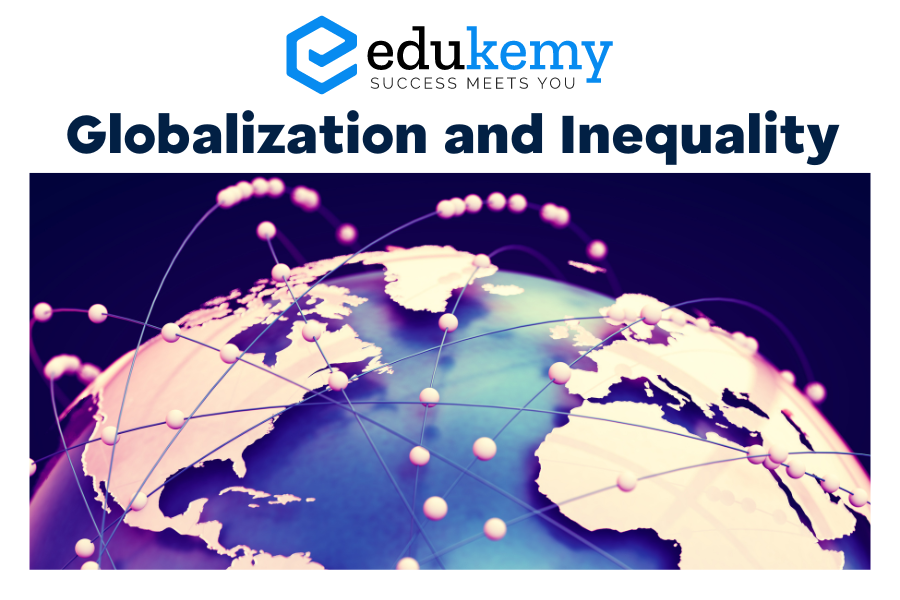
The integration of the world economy through progressive globalization in trade, investment, and finance has reached unprecedented levels, significantly impacting the economic well-being of citizens worldwide. By the first decade of the century, two contrasting schools of thought emerged regarding the impact of globalization on income distribution.
Contents
- 0.1 Positive Viewpoint:
- 0.2 Critical Viewpoint:
- 0.3 Country-Specific Outcomes:
- 0.4 Global Impact:
- 0.5 Addressing Inequality:
- 1 FAQs
- 1.1 1. How has globalization impacted income inequality worldwide?
- 1.2 2. Does globalization benefit the rich more than the poor?
- 1.3 3. How does globalization contribute to inequality within countries?
- 1.4 4. Are there any measures to address inequality amidst globalization?
- 1.5 5. Can globalization also reduce inequality?
- 2 In case you still have your doubts, contact us on 9811333901.
Positive Viewpoint:
- Rising Tide of Income:
- Some argue that globalization leads to a rising tide of income, lifting the economic prospects of all segments. This perspective suggests that even low-income groups in low- and middle-income countries can benefit from globalization, experiencing absolute gains.
Critical Viewpoint:
- Unequal Distribution of Benefits:
- On the contrary, another school of thought contends that while globalization may enhance overall incomes, the benefits are not distributed equally within a country. The widening income disparities limit the inclusive nature of economic growth, posing challenges to sustainability.
Country-Specific Outcomes:
- China’s Experience:
- China is cited as an example where globalization contributed to economic growth, but inequality also increased. The upper-income segments experienced disproportionate gains compared to the middle and lower-income groups.
- India’s Challenges:
- In the case of India, economic growth rates rose, benefiting hundreds of millions and ushering in prosperity. However, concerns arise regarding the inclusivity of this growth. Rising import competition impacted manufacturing employment, and capital-intensive growth hindered employment-intensity. Informalization of employment increased, and financial markets favored the wealthy, exacerbating inequality.
Global Impact:
- Global Social Unrest:
- Uneven globalization has led to social unrest globally. Populist isolationism, trade wars, and nationalist movements in the USA (Donald Trump’s trade wars) and Europe (Brexit and other nationalist movements) have roots in the perceived negative consequences of globalization, contributing to blue-collar and white-collar grievances.
Addressing Inequality:
- Redistributional Interventions:
- In India, there are ongoing redistributional interventions aimed at addressing inequality. However, challenges persist, and progress in areas like education, healthcare, nutrition, and skills development is essential for meaningful improvements.
- Need for Inclusive Growth:
- Bridging inequality requires sustained efforts to ensure inclusive growth, providing opportunities for the lower segments of the population. Until such interventions materialize, there is a risk of stagnation for the lower strata, contributing to the persistence and potential rise of inequality.
In conclusion, the impact of globalization on inequality is complex, with differing outcomes in various countries. While globalization has brought economic growth, it has also contributed to uneven distribution, requiring careful considerations and interventions to achieve more inclusive and sustainable development.
FAQs
1. How has globalization impacted income inequality worldwide?
- Globalization has led to increased income inequality in many countries. While it has lifted millions out of poverty, it has also concentrated wealth among a few. Trade liberalization and outsourcing have shifted jobs from high-wage to low-wage regions, exacerbating income gaps.
2. Does globalization benefit the rich more than the poor?
- Yes, globalization tends to benefit the wealthy disproportionately. It provides opportunities for capital accumulation and investment, often favoring those with financial assets. However, the poor may benefit indirectly through access to cheaper goods and services, but the gains are often overshadowed by income disparities.
3. How does globalization contribute to inequality within countries?
- Globalization can widen the income gap within nations by favoring skilled workers over unskilled ones. Technological advancements and outsourcing lead to higher demand for skilled labor, driving up their wages, while low-skilled workers face job displacement and stagnant wages. This disparity deepens social and economic divisions.
4. Are there any measures to address inequality amidst globalization?
- Governments can implement policies to mitigate the adverse effects of globalization on inequality. These include progressive taxation to redistribute wealth, investing in education and training programs to enhance skills, and strengthening labor rights to ensure fair wages and working conditions. International cooperation is also crucial to address global inequality.
5. Can globalization also reduce inequality?
- While globalization is often associated with widening inequality, it can also contribute to reducing poverty and inequality in certain contexts. Access to global markets can spur economic growth, create job opportunities, and improve living standards, particularly in developing countries. However, ensuring that the benefits of globalization are shared equitably requires proactive policies and mechanisms to address inequality.
In case you still have your doubts, contact us on 9811333901.
For UPSC Prelims Resources, Click here
For Daily Updates and Study Material:
Join our Telegram Channel – Edukemy for IAS
- 1. Learn through Videos – here
- 2. Be Exam Ready by Practicing Daily MCQs – here
- 3. Daily Newsletter – Get all your Current Affairs Covered – here
- 4. Mains Answer Writing Practice – here

